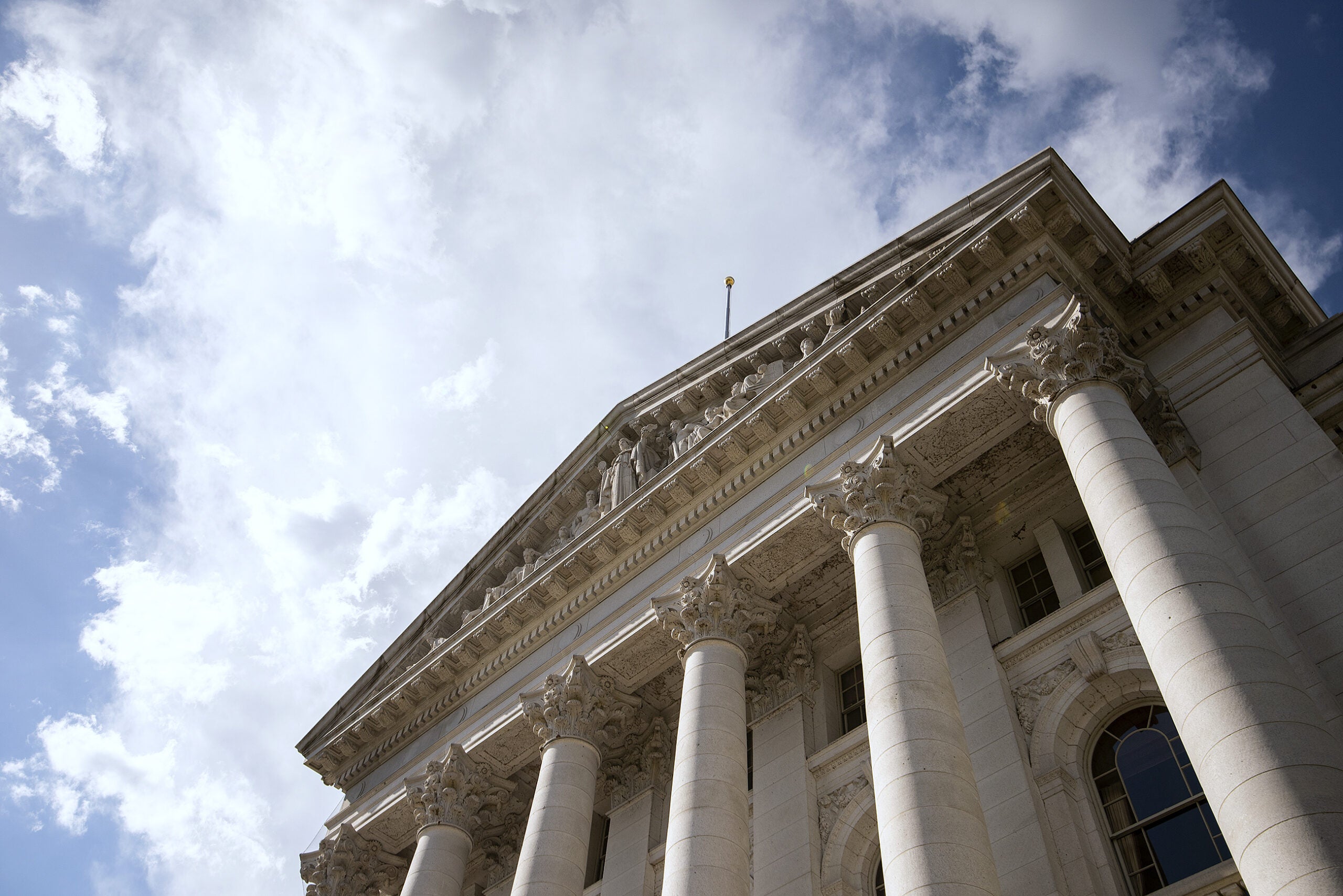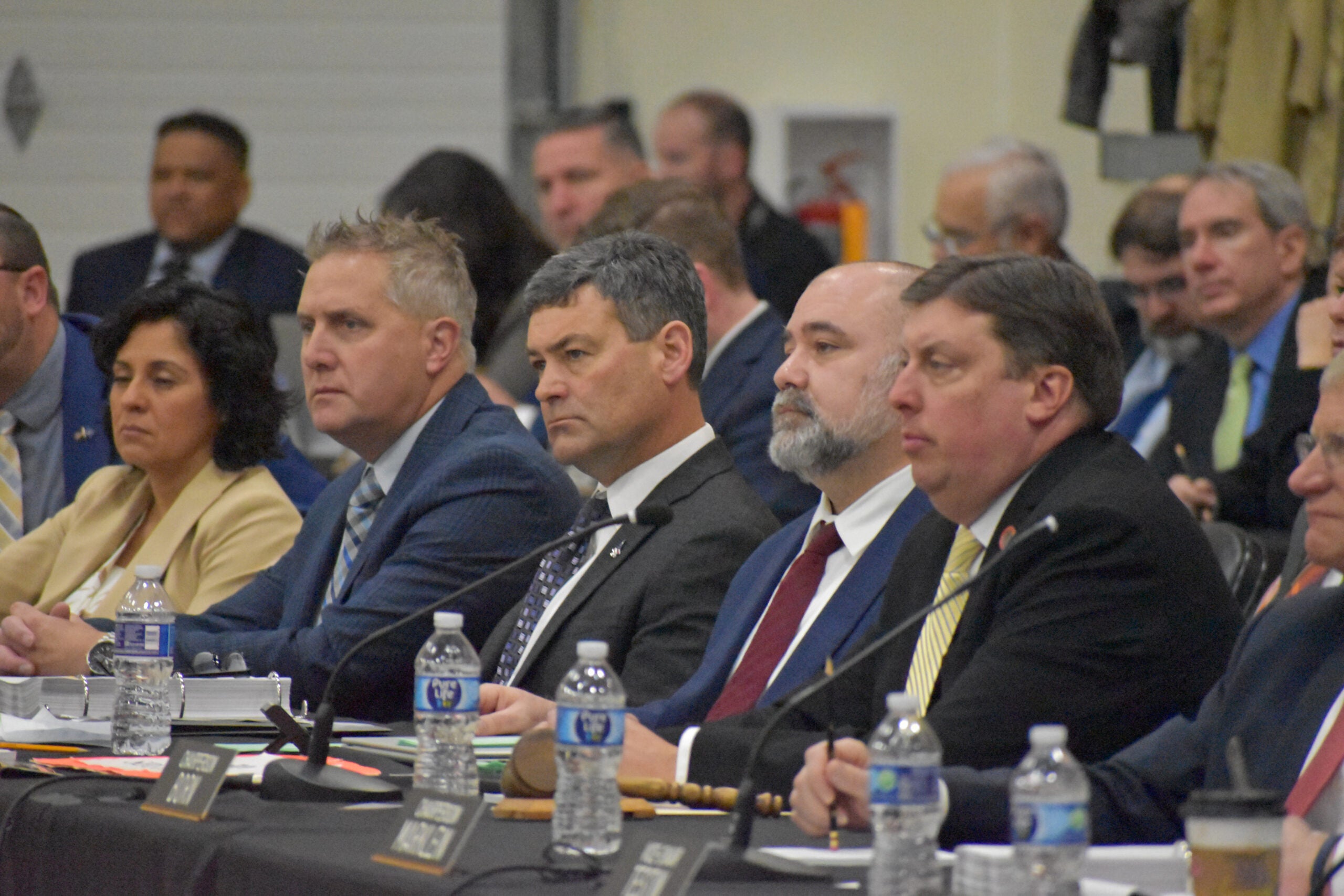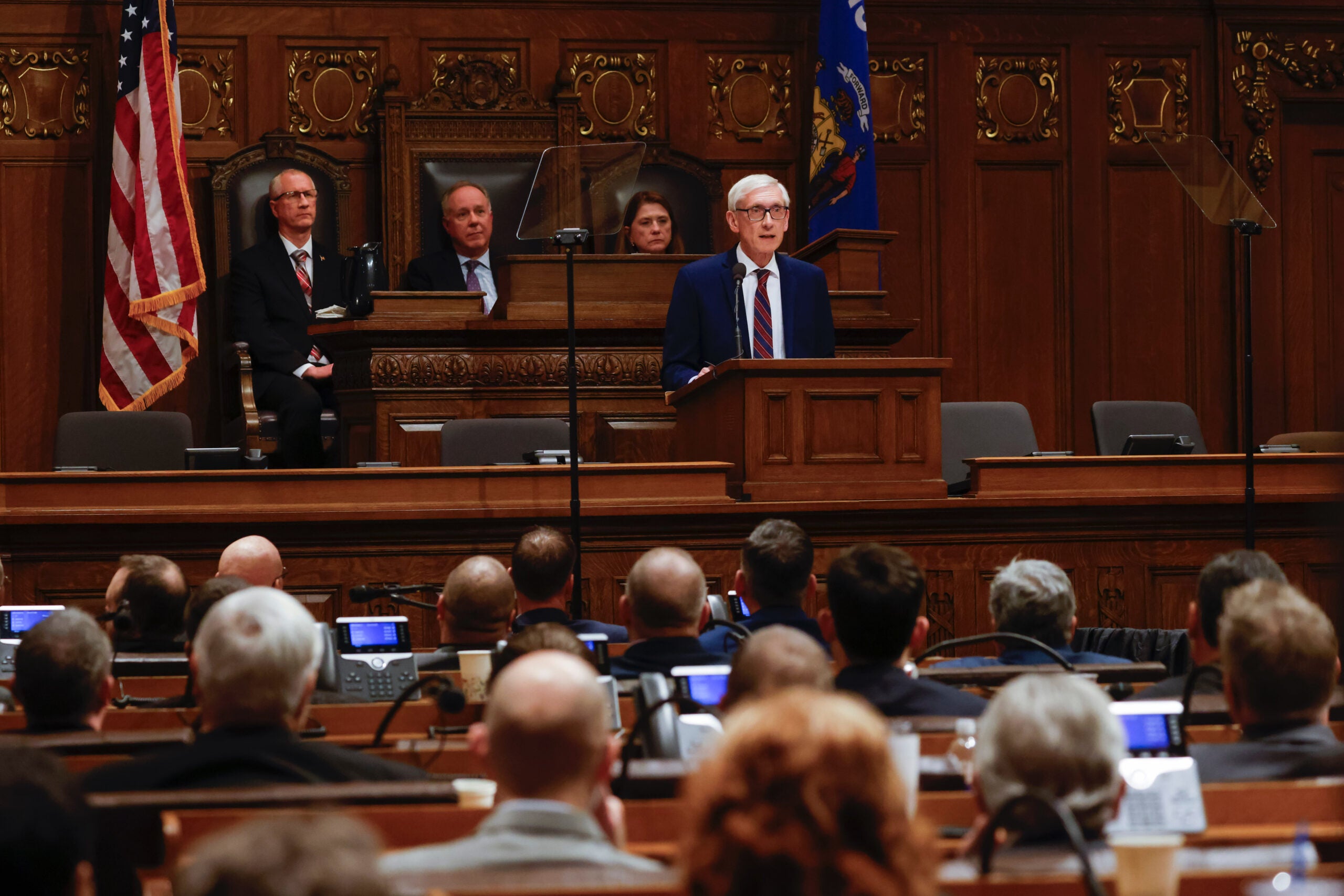Wisconsin Assembly lawmakers voted Tuesday night to approve a two-year state budget that looks very different from the spending plan proposed by Gov. Tony Evers earlier this year.
The budget passed on a vote of 64-34, with all Republicans voting in favor and most Democrats against. Democratic Reps. Deb Andraca of Whitefish Bay, Steve Doyle of Onalaska, Beth Meyers of Bayfield and Don Vruwink of Milton joined Republicans to support the plan.
The Assembly convened Tuesday afternoon to take up the budget approved over the past several weeks by the Republican-controlled state budget committee. The GOP-backed plan includes less overall spending than the governor called for, omits major proposals from Evers — like legalizing marijuana and expanding Medicaid — and uses unprecedented state revenue projections to pay for a $3.4 billion tax cut.
Stay informed on the latest news
Sign up for WPR’s email newsletter.
During debate, Republicans said the proposed budget is reasonable and responsible. Meanwhile, Democrats argued Republicans are more focused on blocking Evers’ policy goals and derailing his 2022 re-election campaign than serving Wisconsinites.
“(Republicans) define success by Gov. Evers losing,” said Rep. Evan Goyke, D-Milwaukee.
Assembly Speaker Robin Vos, R-Rochester, pushed back on Goyke’s comments, arguing the Republican-backed budget is “forward-looking.”
“The reality is that this is a good budget for Wisconsin,” he said. “This is a good budget that focuses on our priorities.”
During debate, Doyle said he broke ranks with the majority of Democrats opposing the budget because he believes Evers will use his veto pen to improve the plan. The governor has one of the most powerful veto pens in the country, with the ability to delete words, numbers and punctuation from the budget.
GOP Education Budget Spends Millions Less Than Governor’s Plan
The Assembly-approved budget diverges widely from the governor’s proposed spending plan — and particularly so for education funding in Wisconsin.
For his part, Evers called for a $1.6 billion increase in funding for K-12 schools across the state. A major element of that plan was a proposed $713 million increase in special education funding. Right now, the state picks up about 28 percent of eligible special education costs for districts — Evers’ budget would have increased that to 50 percent.
In contrast, Republican lawmakers on the state budget committee initially approved an increase of just $128 million in state tax funding for K-12 schools over the next two years. That plan raised concerns from the federal government about whether Wisconsin would fund schools enough to qualify for $2.3 billion in aid under the two most recent Congressional coronavirus packages. In response, Republicans added $647 million to school spending, but those funds will not increase what schools have to work with. Instead, the additional state money is directed toward filling a gap created by a proposed property tax cut from GOP lawmakers. Those property taxes would have been used to fund K-12 schools and higher education.
According to the Legislature’s nonpartisan budget office, the spending increase will meet the federal aid requirements for school spending.
During Tuesday’s debate, Rep. Mark Spreitzer, D-Beloit, argued the GOP education plan “attempts to skate by and put the bare minimum in our schools to check a box for federal funds.”
“Budgets are about priorities, and it’s clear this budget doesn’t prioritize our schools, it does not prioritize our students,” Spreitzer said.
Republicans argued the large influx of federal government aid money over the next few years will be sufficient to support schools.
“The governor knew full well he was not getting what he was asking for in that budget — it was a liberal wish list from top to bottom and education was no exception,” said Rep. Jeremy Thiesfeldt, R-Fond du Lac, a former teacher. “Funding our schools is certainly an important issue … but I also realize we have a lot of other things in our budget that we have to spend money on.”
For the University of Wisconsin System, the GOP-backed budget includes an increase of just $8 million over two years, a fraction of the $191 million proposed by the governor. The plan also includes ending the eight-year-long tuition freeze at UW System schools and just $629 million of the governor’s $1 billion plan for state building projects within the UW System. System advocates have raised concerns for years about aging buildings on campuses across the state, some of which have spurred safety concerns.
Marijuana Legalization, Other Major Proposals Stripped From Spending Plan
Early on in the budget process, Republican lawmakers were quick to remove many of the governor’s proposals from the spending plan.
In May, the budget committee voted along party lines, with Republicans in favor and Democrats against, to remove 384 of the governor’s budget provisions with a single vote.
Among the proposals was the acceptance of a federal expansion of Medicaid, also known as BadgerCare in Wisconsin, to offer coverage to Wisconsinites who make up to 138 percent of the federal poverty level. The plan would have extended coverage to about 91,000 more people in the state and brought in an additional $1 billion in federal incentives aimed at states who haven’t yet taken the expansion. The $1 billion is one-time funding.
On Tuesday, Democrats immediately proposed an amendment to the budget to accept Medicaid expansion. They argued it makes good fiscal sense to accept the federal money to help fund projects across the state and that Wisconsinites would benefit from increased access to health insurance.
“The reality is that health care should not be a privilege afforded only to those who are healthy enough to get it and wealthy enough to afford it,” said Rep. Lisa Subeck, D-Madison.
Rep. Mark Born, R-Beaver Dam, who co-chairs the budget committee, argued Wisconsin shouldn’t depend on federal dollars — like the Medicaid incentive money —to fund its priorities.
“We don’t need this amendment to seek more federal dollars,” Born said. “We don’t need to grow government.”
Other proposals from Evers stripped from the budget include:
- Legalizing recreational and medical marijuana in Wisconsin, and using an estimated $165 million in tax revenue for things like rural school support.
- Restoring union rights lost under former Gov. Scott Walker’s landmark Act 10 collective bargaining law.
- Requiring universal background checks for firearm purchases.
- Raising Wisconsin’s minimum wage to $10.15 per hour from $7.25 per hour. It has not changed since 2009.
- Creating a system of automatic voter registration.
- Modernizing Wisconsin’s unemployment insurance system at a cost of $80 million.
- Eliminating the one-week waiting period for unemployment benefits.
- Increasing weekly benefits for unemployment insurance.
- Scaling back a tax credit for the wealthiest manufacturers and a tax credit for capital gains, moves that would generate a combined $838 million for state government.
Republicans have called those plans “fantasy” and “political talking point garbage,” saying Evers introduced them knowing the GOP majority would not get on board.
In response, Democrats have argued many of the proposals have strong public support. An April 2019 survey from Marquette University Law School found 70 percent of voters supported taking the federal Medicaid expansion. The same survey found 59 percent of voters said marijuana should be legal while 83 percent favored medical marijuana.
Republicans Tout Multi-Billion Dollar Tax Cut
Earlier this month, Republicans unveiled a $3.4 billion tax cut to be included in the budget that channels much of an expected $4.4 billion increase in tax collections over the next three years back to taxpayers.
“This surplus was built by the people of Wisconsin, by our workforce, by our businesses and our communities,” Born said during debate. “And that’s why we’re going to focus on sending a large part of that surplus back to those folks.”
Under the proposal, income taxes would be cut by $2.75 billion, property taxes would be decreased by about $650 million, and businesses would save $200 million on personal property taxes over the next two years.
The income tax cut would apply to individuals who earn between $23,930 and $263,480 per year and married couples who file taxes jointly and earn between $31,910 and $351,310 per year. It would lower taxes for those brackets from 6.27 percent to 5.3 percent. According to the Legislature’s nonpartisan budget office, that change is expected to cost the state about $2.4 billion over two years. An individual or family that earns between $50,000 and $60,000 per year would save $172 on income taxes annually, the budget office said.
Other income tax changes include an exemption for some active duty military and an update to the state’s tax withholding tables.
The property tax changes would:
- Buy down property taxes that fund schools by increasing state general school aid funding by $408 million over two years.
- Provide $167 million to replace property tax funding sent to charter schools associated with the City of Milwaukee, UW-Milwaukee and UW-Parkside.
- Spend $72 million on buying down property taxes directed to the Wisconsin Technical College System.
The Republican proposal would also eliminate the personal property tax for businesses beginning in 2022, a measure that would cost $200 million that year, according to the budget office. This element of the plan has an extra step, however — it would have to be approved in a bill passed by the Legislature and signed by the governor. Assembly Republicans pointed out Wisconsin is one of the few Midwestern states with a personal property tax in place.
Senate To Consider Budget Wednesday
The state Senate is scheduled to consider the spending plan Wednesday. If that chamber also approves it, the budget will move to Evers’ desk for his signature.
The governor’s intent to sign or veto the budget is unclear. He could use his veto pen to make some changes to the spending plan, as he did two years ago. Evers also has the option to veto the entire spending plan, which he has said he hasn’t ruled out. If he does so, the budget negotiation process will start over from scratch and the current state spending plan will remain in effect to fund programs.
Editor’s note: Wisconsin Public Radio is a service of the University of Wisconsin-Madison and the Wisconsin Educational Communications Board.
Wisconsin Public Radio, © Copyright 2025, Board of Regents of the University of Wisconsin System and Wisconsin Educational Communications Board.





